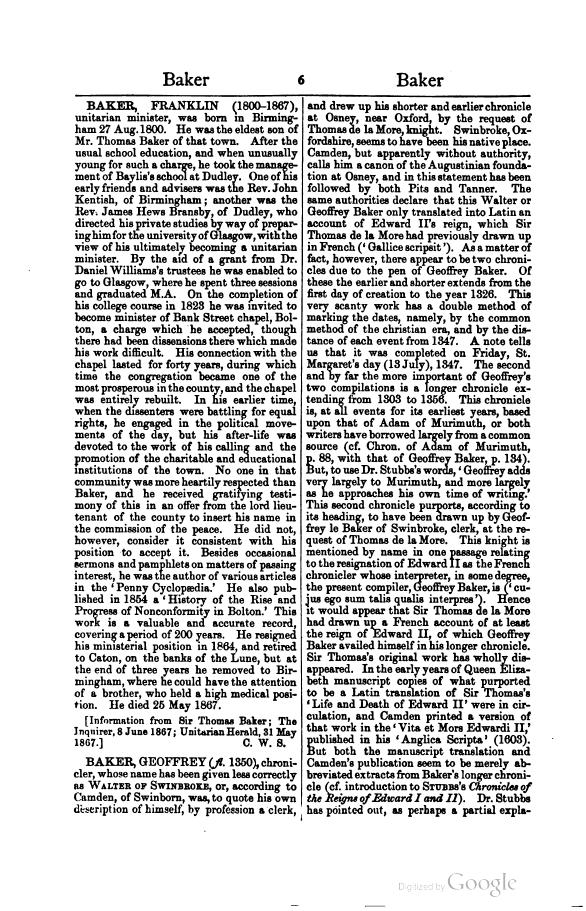BAKER, FRANKLIN (1800–1867), unitarian minister, was born in Birmingham 27 Aug. 1800. He was the eldest son of Mr. Thomas Baker of that town. After the usual school education; and when unusually young for such a charge, he took the management of Baylis's school at Dudley. One of his early friends and advisers was the Rev. John Kentish, of Birmingham; another was the Rev. James Hews Bransby, of Dudley, who directed his private studies by way of preparing him for the university of Glasgow, with the view of his ultimately becoming a Unitarian minister. By the aid of a grant from Dr. Daniel Williams's trustees he was enabled to go to Glasgow, where he spent three sessions and graduated M.A. On the completion of his college course in 1823 he was invited to become minister of Bank Street chapel, Bolton, a charge which he accepted, though there had been dissensions there which made his work difficult. His connection with the chapel lasted for forty years, during which time the congregation became one of the most prosperous in the county, and the chapel was entirely rebuilt. In his earlier time, when the dissenters were battling for equal rights, he engaged in the political movements of the day, but his after-life was devoted to the work of his calling and the promotion of the charitable and educational institutions of the town. No one in that community was more heartily respected than Baker, and he received gratifying testimony of this in an offer from the lord lieutenant of the county to insert his name in the commission of the peace. He did not, however, consider it consistent with his position to accept it. Besides occasional sermons and pamphlets on matters of passing interest, he was the author of various articles in the 'Penny Cyclopœdia.' He also published in 1854 a 'History of the Rise and Progress of Nonconformity in Bolton.' This work is a valuable and accurate record, covering a period of 200 years. He resigned his ministerial position in 1864, and retired to Caton, on the banks of the Lune, but at the end of three years he removed to Birmingham, where he could have the attention of a brother, who held a high medical position. He died 26 May 1867.
[Information from Sir Thomas Baker; The Inquirer, 8 June 1867; Unitirian Herald, 31 May 1867.]
BAKER, GEOFFREY (fl. 1350), chronicler, whose name has been given less correctly as Walter of Swinbroke, or, according to Camden, of Swinborn, was, to quote his own description of himself, by profession a clerk, and drew up his shorter and earlier chronicle at Osney, near Oxford, by the request of Thomas de la More, knight. Swinbroke, Oxfordshire, seems to have been his native place. Camden, but apparently without authority, calls him a canon of the Augustinian foundation at Osney, and in this statement has been followed by both Pits and Tanner. The same authorities declare that this Walter or Geoffrey Baker only translated into Latin an account of Edward II's reign, which Sir Thomas de la More had previously drawn up in French (‘Gallice scripsit’). As a matter of fact, however, there appear to be two chronicles due to the pen of Geoffrey Baker. Of these the earlier and shorter extends from the first day of creation to the year 1326. This very scanty work has a double method of marking the dates, namely, by the common method of the christian era, and by the distance of each event from 1347. A note tells us that it was completed on Friday, St. Margaret's day (13 July), 1347. The second and by far the more important of Geoffrey's two compilations is a longer chronicle extending from 1303 to 1356. This chronicle is, at all events for its earliest years, based upon that of Adam of Murimuth, or both writers have borrowed largely from a common source (cf. Chron. of Adam of Murimuth, p. 88, with that of Geoffrey Baker, p. 134). But, to use Dr. Stubbs's words, ‘Geoffrey adds very largely to Murimuth, and more largely as he approaches his own time of writing.’ This second chronicle purports, according to its heading, to have been drawn up by Geoffrey le Baker of Swinbroke, clerk, at the request of Thomas de la More. This knight is mentioned by name in one passage relating to the resignation of Edward II as the French chronicler whose interpreter, in some degree, the present compiler, Geoffrey Baker, is (‘cujus ego sum talis qualis interpres’). Hence it would appear that Sir Thomas de la More had drawn up a French account of at least the reign of Edward II, of which Geoffrey Baker availed himself in his longer chronicle. Sir Thomas's original work has wholly disappeared. In the early years of Queen Elizabeth manuscript copies of what purported to be a Latin translation of Sir Thomas's ‘Life and Death of Edward II’ were in circulation, and Camden printed a version of that work in the ‘Vita et Mors Edwardi II,’ published in his ‘Anglica Scripta’ (1603). But both the manuscript translation and Camden's publication seem to be merely abbreviated extracts from Baker's longer chronicle (cf. introduction to Stubbs's Chronicles of the Reigns of Edward I and II). Dr. Stubbs has pointed out, as perhaps a partial expla-
